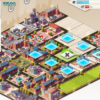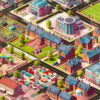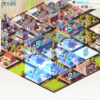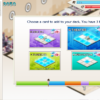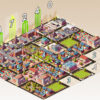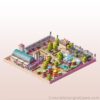The developer, Cole Jefferies, describes his game succinctly: “Concrete Jungle is an indie game about city planning and deck-building!”
Concrete Jungle is an isometric game in which you use alloted cards to build and manage a city over time. Cards in your deck are used to place buildings. As your city grows, it becomes more difficult to manage. To meet this challenge, players are given the opportunity to improve their deck throughout the game, by choosing new cards from a random assortment.
The game went up on Kickstarter and Greenlight recently, and succeeded on both fronts, so it’s well on its way to being finished.
Jefferies has promised the game has no free-to-play mechanics or micro-transactions, although a lot of the content will be unlockable over time instead of immediately available.
In theory, the pleasant slope of difficulty and complexity, and the content-over-time philosophy, will prevent the game from becoming stale or punishing.
Concrete Jungle consists of three modes. Solo story mode has players play as voiced, unlockable characters; and multiplayer consists of player vs. AI, and a local competitive/co-op multiplayer for up to four players (1 vs. 1 or 2 vs. 2). High scores will be listed online for all modes.
The game handsomely exceeded its Kickstarter goal, so voters got to decide how the extra funds would be used: more buildings and more characters will be added, as well as more visual effects such as weather and a day/night cycle. Jefferies would also like to add people to the streets but has made it clear he doesn’t know how it will affect the game’s performance, so that’s undecided. The game will be available in multiple languages, English, French, Spanish, and German at a minimum.
The stretch goal contents won’t all be available immediately, because Jefferies wants to get the game out on schedule. What he’s decided to do is release the game as originally planned, and then add the free content over time.
Concrete Jungle should release some time in May, and will be available for both Windows and Mac, with a Linux port being a possibility later.
